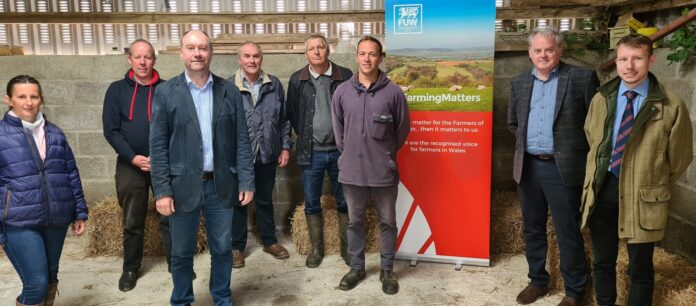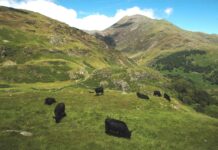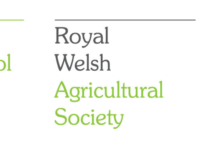Farmers from Ceredigion, Carmarthen and Pembrokeshire have highlighted concerns of the industry, including the future of agricultural policy in Wales and bovine TB, when they met with Cefin Campbell Member of the Senedd for Mid and West Wales.
Hosting the meeting was Farmers’ Union of Wales member Meirion Rees, who farms in partnership with his parents, Val and Meurig Rees at Penrallt Meredith, Crosswell, Eglwyswrw.
The family farming business was started by Meirion’s parents, Val and Meurig, over 40 years ago. Originally a dairy farm the family stopped milking around 20 years ago and kept suckler cows and sheep.
Meirion went to University in Cardiff to study civil engineering and spent 10 years working on different engineering projects in all parts of the country. However, he always kept an interest in the farm and helped out when he could. Eight years ago he moved back to the farm full time.
Today the family no longer keep cattle themselves due to the TB problem in the area. They look after 650 acres plus common land rights and focus on sheep farming, keeping 2,000 breeding Welsh mountain ewes.
Speaking to Cefin Campbell about the future of agricultural policies, Meirion Rees highlighted that while the provision of public goods is part of the answer when it comes to a future agricultural support scheme in Wales, it must also provide stability and security for family farms, support for rural communities and Welsh jobs and facilitate sustainable agriculture.
“Many of the concerns the Union raised in response to the 2018 Brexit and Our Land consultation are yet to be addressed and the deadline for having a Welsh Agriculture Bill finalised and in place is fast approaching. It just makes me nervous when I think of our future and I hope that the Welsh Government will continue to work with farmers and the Union to build a scheme that works for our industry and for Wales,” said Meirion Rees.
The FUW has been clear that a form of baseline payment must be retained in any future scheme given that around 80% of farmers in Wales rely on the Basic Payment Scheme (BPS) to generate a profit.
“Farms need to be financially and commercially viable in order to provide environmental outcomes for the benefit of Wales. We can’t go green if we’re in the red,” added Meirion.
Meirion further emphasised how important the Glastir Commons scheme is to his business and the farming system. The land is a mixture of hill and lowland and includes grazing rights on the Preseli Hills and MOD land at Castlemartin, an agreement that has been in place for over 60 years.
The common land grazing rights are crucial to the success of the business. “We have a Glastir Commons agreement in place which means that the Preseli Hills are cleared of stock between November and the start of March. The scheme has been important in helping to manage the mountain as there are certain costs and losses involved in actively managing it,” he said.
Thinking about the future, Meirion is worried about how the future agricultural schemes will work on common land. He said: “It is vital that common land is actively managed and Glastir Commons alongside the BPS payment currently assists farmers like me in continuing to manage the common land habitats through grazing. We need to work with the Welsh Government to understand how this environmentally important activity can be incorporated into a public goods scheme.”
Meirion was clear that people won’t keep sheep on the land if they can’t make money from them. “We need a balance in the scheme between recognising the importance of producing food and providing public goods,” he said.
Union officials also highlighted the ongoing problem with bovine TB in the area, emphasising that the current policy was not working considering the ongoing high recurrence rate.
FUW Pembrokeshire County Executive officer Rebecca Voyle said: “Whilst the FUW is generally supportive of blanket measures such as annual and pre-movement bTB testing, considerable concern exists regarding the proportionality of some measures and the severe economic restrictions they place on farms.”
It was noted that cattle vaccination trials have begun on behalf of the Welsh Government and other devolved administrations as part of a long-term strategy towards possible vaccine rollout by 2025.
“Cattle vaccination, in combination with a usable DIVA test, can act as a preventative measure and play a vital role towards achieving Welsh Government’s 2041 target for bTB freedom rather than the current ‘reactive’ approach. However, this cannot be considered as a silver bullet as it remains just one method of bTB control. The FUW continues to support a holistic approach to bTB control in Wales which is guided by science rather than short term politics,” added Mrs Voyle.
Help keep news FREE for our readers
Supporting your local community newspaper/online news outlet is crucial now more than ever. If you believe in independent journalism, then consider making a valuable contribution by making a one-time or monthly donation. We operate in rural areas where providing unbiased news can be challenging. Read More About Supporting The West Wales Chronicle

























